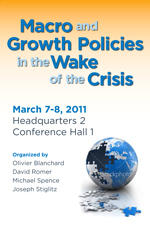SESSION VI: The International Monetary System
With the ongoing talk of "currency wars", reform of the international monetary system is now at the top of the G20 agenda. A key issue is whether the current arrangements for global liquidity provision can be improved upon. Precautionary saving in the form of reserve accumulation is socially inefficient. Bilateral swap lines only benefit some countries, not others. So, new arrangements are being proposed, including allocations of special drawing rights (SDRs) and the creation of a contingent liquidity window at the IMF to provide liquidity to a large number of countries under conditions of high systemic risk. Another key issue is whether countries should be free to run large current account imbalances, or whether there should be multilateral rules of the game.
Background notes on the international monetary system
CHAIR
 | John Williamson
Currency Wars?
Reference Rates and the International Monetary System
John Williamson was born in 1937 and educated at the London School of Economics and Princeton University.
More
He has taught at the Universities of York (1963-68) and Warwick (1970-77) in England, the Pontifícia Universidade Católica do Rio de Janeiro (1978-1981) in Brazil, as a Visiting Professor at MIT (1967 and 1980), LSE (1992), and Princeton (1996), and as an Honorary Professor at the University of Warwick (1985-2008).
He was an economic consultant to the UK Treasury in 1968-70, where he worked on a range of international financial issues, and an advisor to the International Monetary Fund in 1972-74, where he worked mainly on questions of international monetary reform related to the work of the Committee of Twenty. He has been a Senior Fellow at the Peterson Institute for International Economics in Washington, DC, since its founding in 1981. From 1996-99 he was on leave from the Institute to serve as Chief Economist for the South Asia Region of the World Bank.
In 2001 he served as Project Director for the UN High-Level Panel on Financing for Development (the Zedillo Panel). He retains his British nationality.
|
DISCUSSANTS
 | Már Guðmundsson
The financial crisis in Iceland and the fault lines in cross-border banking
Financial globalisation: key trends and implications for the transmission mechanism of monetary policy
Financial globalisation and challenges for prudential policies and macroeconomic management
Már Guðmundsson was appointed Governor of the Central Bank of Iceland in 2009. Before taking that position, he was Deputy Head of the Monetary and Economic Department at the Bank for International Settlements and a member of the Banks senior management.
More
Mr. Guðmundsson pursued his university studies in Sweden and the United Kingdom. After graduating from the University of Cambridge with an M Phil degree, he entered central banking in 1980 as an economist at the Central Bank of Iceland, where he later became Chief Economist (1994-2004). From 1988-1991 he was the Chief Economic Adviser to the Minister of Finance in Iceland. Mr. Guðmundsson has been a member of governmental committees on various subjects, including central bank legislation, pension reform, and energy. He has served on the board of a ferrosilicon company and for several years was the Chairman of the Board of one of Icelands largest pension funds. In 1998-1999, he was an IMF adviser to the Central Bank in Trinidad and Tobago.
Mr. Guðmundssons main research interests center on exchange rate regimes, monetary and financial stability, and pensions. He has published widely in Icelandic, English, and Swedish journals and has served on editorial boards in Iceland and the UK. He was a member of the Council of Management of the European Money and Finance Forum (www.suerf.org) from 2007 to 2009. Since becoming Governor of the Central Bank of Iceland, he has given several speeches, both in Iceland and abroad, that are available on the website of the Central Bank of Iceland (www.sedlabanki.is).
|
 | Olivier Jeanne
Olivier Jeanne joined the Johns Hopkins Department of Economics in September 2008, after ten years in various positions at the Research Department of the International Monetary Fund.
More
His research spans an array of applied and theoretical topics in international and domestic macroeconomics: capital flows, exchange rate regimes and currency crises, sovereign debt and defaults, international liquidity, and monetary policy.
He is a Research Associate at the National Bureau of Economic Research (NBER, Cambridge MA), a Research Fellow at the Center for Economic Policy Research (CEPR, London), and a visiting Senior Fellow at the Peterson Institute for International Economics (Washington DC).
|
 | Charles Collyns
Charles Collyns was confirmed by the United States Senate to serve as the U.S. Department of the Treasury's Assistant Secretary for International Finance. In this position, Collyns is responsible for leading Treasury's work on international monetary policy, international financial institutions, coordination with the G-7/G-8 and G-20, and regional and bilateral economic issues.
More
Collyns served as the Deputy Director of the Research Department at the International Monetary Fund (IMF), where he led the team responsible for preparing the "World Economic Outlook." Prior to joining the Research Department in 2006, he has held a range of positions at the IMF, including being responsible for the organization's work on Japan from 1997-2001, on the United States from 2001-2003, and on Brazil from 2004-2006.
Collyns has also authored a number of publications on international macro-economics. In addition to the "World Economic Outlook" report, he co-authored "Post Bubble Blues - How Japan Responded to Asset Price Collapse," "Managing Financial Crises - Recent Experience and Lessons for Latin America," and "Stabilization and Reform in Latin America - A Macroeconomic Perspective on the Experience since the early 1990s."
He received a Doctorate in Economics from Oxford University after obtaining first class honors as an undergraduate at Cambridge University.
|
 | Maurice Obstfeld
Too much focus on the yuan?
Reserve accumulation and financial stability
Lenders of Last Resort in a Globalized World
Maurice Obstfeld is the Class of 1958 Professor of Economics at the University of California, Berkeley, and Director of the Center for International and Development Economic Research (CIDER).
More
Professor Obstfeld joined Berkeley in 1989 as a professor, following appointments at Columbia (1979-1986) and the University of Pennsylvania (1986-1989). He was also a visiting professor at Harvard between 1989 and 1991. He received his Ph.D. from MIT in 1979.
Professor Obstfeld serves as honorary advisor to the Bank of Japan's Institute of Monetary and Economic Studies. Among Professor Obstfeld's honors are the Carroll Round Keynote Lecture, Woodward Lecture, and Bernhard Harms Prize and Lecture in 2004. Professor Obstfeld is a Fellow of the Econometric Society and the American Academy of Arts and Sciences. He is active as a Research Fellow of CEPR, a research associate at NBER, and an International Research Fellow at the Kiel Institute of World Economics.
|






